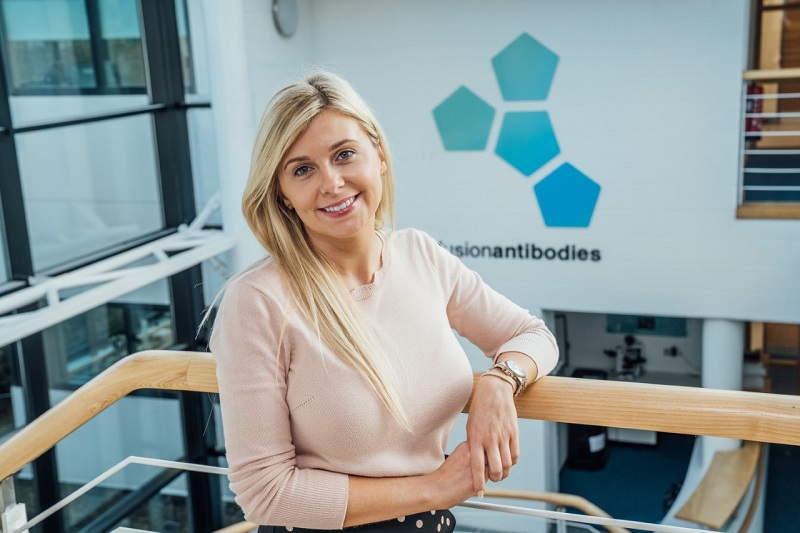Leona McGirr, a former KTP associate at Queen’s and a Team Leader at Fusion Antibodies on how to hone your lateral thinking skills to land that graduate role.

Why are problem solving abilities essential in virtually in any graduate rule?
Yeah, in any job, you’ll always have to solve problems…There’s always an opportunity to solve a problem. Anything from small like fixing the printer to something bigger, like what we’re working on and trying to find a treatment for COVID. And so there’s always an opportunity to learn and develop these problem solving skills.
How can you develop this problem solving skills and demonstrate them to the employers to the recruiters?
Look at the root cause of the problem and ask the question, why. Start tweaking things, and see, we’ll see what you get, essentially, instead of just spending and buying a new something, and so can always ask the question, why and if you give these examples to the employer, that they will say that these skills are transferable.
How will interviewers assess how you approach the problems? And how can you demonstrate your logic and implementation to the recruiters?
Give loads of examples and those different examples both in your personal life and in work because as I said, all these skills are transferable. And it kind of gives the people who are interviewing you an opportunity to see what type of person you are and how you solve the problems and how you go about doing this.
How can you answer a problem solving competency based question? How can you answer them?
We would always use the STAR method, which is you say the situation, the task, the action and the result. And so just make sure to include each one of them within any example that you give, that’s usually the most common way of doing it.
To what extent can games such as Sudoku, or Chess, can help strengthen your ability to swing strategy early and creativity?
I actually think all scientists love chess as well. It essentially lets you kind of plan ahead and see the bigger picture and see how one little thing that you do can impact and essentially either win the game or lose the game for you. Again, it’s very transferable into science trying to fix a wee problem on a stage every time.
Are there any problem solving techniques you can develop or refer to our students?
So for us in R&D, our standard way would be root cause analysis. So essentially, you ask the five why’s. So for example, an experiment didn’t work? Well, why it didn’t work? Because the two proteins didn’t bind? Well, why didn’t they bind? Because maybe one wasn’t stored correctly? Well, why wasn’t it stored correctly, and then bring it down to well, actually, there wasn’t enough space in the fridge. So even though you thought it might have been one thing, by the time that you break it down and ask why every stage, you realise that it’s actually something else, and it ensures that it won’t happen again.
What is creative thinking? And how can you demonstrate it?
It’s really having a different viewpoint and a different perspective on a problem. And I think that’s essentially key. For example, in my current company, I was the first chemist in an essentially biological company. So I was able to offer a different perspective on things. And it’s usually quite creative in comparison to what everybody else might think. And it’s just drawn on my existing skills and experience.
Why it is so important to show a recruiter that you come up with an innovative solutions to a problem, or an improved way of doing things? Why it is so important?
Because it shows that the candidate is willing to learn, and they’re innovative, and they’re creative. And essentially, in a workplace, everything can be improved. The worst thing, what we want to hear would be somebody who says, this is how it’s always done, instead of asking, why has it been done? And just don’t accept the first answer. Always keep asking why, and how can you improve? Both in your personal life and in work.
Why do recruiters like to see a creative thinking in a graduate hires?
Well, it really shows the potential and shows that somebody can take initiative to try and solve a problem where more sided escalating, and having that under control, and that there is a lot of potential that you can develop that particular skill. So we’re always keen to see that.
So how to demonstrate your creativity in graduate applications, or let’s say in interviews?
Yeah, give loads of different examples, and be it something you’ve done, maybe a hobby even. It’s really nice to hear all these different examples, instead of always referring to one example, maybe your degree, always ask or always talk about personal life, part time, jobs, everything, because it allows us to see what type of person you are, as well and a lot of times, the stories are actually really interesting.
Okay, how do you develop or improve this, so, you know, creativity skills, how to improve it?
I would say just take every opportunity and go take a few risks, and don’t be afraid to try and do something outside of your comfort zone. With every stage of my career, I have challenged myself, and have always had a very steep learning curve. And I think that is actually quite a lot of fun. And again, it allows me to be creative in different ways and drawn different strengths.
So can you give us some examples of lateral thinking to draw on in an application process?
Yes. So essentially, think outside the box, and don’t take the most obvious answer as being the root cause. And if you can disprove something, well, it then in theory can be a possible solution. Ideally, what we would do is we will get a post-it note and we’d all sit around and be like, well, what happens if this was the case? Or I wonder, could this be the case? And you just go crazy with this and don’t rule anything out.
What are the links between problem solving and entrepreneurism and a good leadership?
I think being an entrepreneur and a true leader, you need to be innovative. You need to challenge yourself and not be scared to take a few risks. And the most important thing is to learn – the road to being an entrepreneur and your own career is bumpy. You can go on a few circles, but as long as you learned, that’s the most important thing I think.
So how can you problem solve in a workplace?
Anything from something minor like fixing the Wi Fi, fixing a computer, fixing kettle, they are all problem solving. So initially asked me, well, what’s the problem? or how can I make this current situation better? You can always improve just incrementally try something, try different lead and maybe see what the result is and just document what that result is, and see, can you improve?
So how can you bring this creativity in your graduate roles?
I would learn around the subject and draw on your own past experiences. I don’t think there’s, no such thing as a stupid suggestion. All ideas are good ideas. A lot of the time, you need to ask other people for advice as well and see how they would approach something.
Don’t be afraid to take a challenge. Take all the opportunities you can. I still don’t have my own career figured out, I don’t know where I’ll be in 10 years, 20 years time, but I know it’s going to be loads of fun. I would advise anybody to take any opportunity and just have fun along the way.

Interested in KTP at Queen’s. Find out more here.
